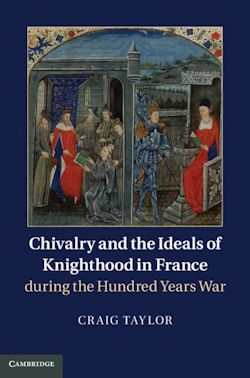 Sponsored by CMEMS and the Institute of Advanced Studies, Dr Craig Taylor (The University of York) is coming to visit in late June 2014. As well as taking part in the PMRG/CMEMS/CHE Symposium, ‘In Form of War: Emotions and Warfare in Writing, 1100-1820’, we can look forward to a Postgraduate Masterclass on ‘Chivalry’ and a public lecture on ‘The Trials of Joan of Arc’ on 26 June.
Sponsored by CMEMS and the Institute of Advanced Studies, Dr Craig Taylor (The University of York) is coming to visit in late June 2014. As well as taking part in the PMRG/CMEMS/CHE Symposium, ‘In Form of War: Emotions and Warfare in Writing, 1100-1820’, we can look forward to a Postgraduate Masterclass on ‘Chivalry’ and a public lecture on ‘The Trials of Joan of Arc’ on 26 June.
IAS/CMEMS Postgraduate Masterclass: ‘Chivalry’
In this masterclass, I will be asking students to consider the fundamental confusions that beset our modern use of the term ‘chivalry’. In general usage, the term now carries a set of romantic connotations that barely reflect neither the reality of aristocratic behaviour during the middle ages, nor the more complex representations offered by medieval commentators and writers. We will therefore consider how far such anachronistic assumptions prevent real engagement with the medieval past, as well as the deeper problem of defining chivalry simultaneously as the textual representation of knightly values and the wider aristocratic culture.
For more details, or to register, see: http://www.ias.uwa.edu.au/masterclass/taylor
IAS/CMEMS Public Lecture: ‘The Trials of Joan of Arc’
This lecture will explore the two great trials of the celebrated French heroine, firstly at Rouen in 1431 while in the hands of her enemies and then between 1455 and 1456, when a posthumous investigation nullified the verdict of the original trial. Given the rejection of the original trial as a sham, it is natural that modern scholars have offered increasingly sophisticated analyses of the records of Joan’s public and private interrogations at Rouen in 1431; under such careful scrutiny, these sources raise fascinating questions regarding the ‘truthfulness’ of medieval records and of Joan’s story, as well as different kinds of insights into wider questions of religion and gender in late medieval society. Yet the records of the second trial have not received as careful attention, in large part because they remain pivotal to undermining the credibility of the original heresy trial. In this lecture, I will therefore turn the spotlight into the second trial, suggesting new ways in which scholars might approach these familiar records.
For more details, or to book a seat (this is a free public lecture, but RSVPs are requested), see: http://www.ias.uwa.edu.au/lectures/taylor
About Dr Craig Taylor
Craig Taylor is a Senior Lecturer in Medieval History at the University of York, and a Fellow of both the Société de l’Histoire de France and the Royal Historical Society. Craig is currently Chair of the Graduate Board of Studies in the Department of History at the University of York, and in October 2014will become Director of the internationally-renowned Centre for Medieval Studies.
His research focuses upon the political, aristocratic and martial cultures of late medieval France and England, and in particular the intellectual and cultural representations of chivalry and warfare in the age of the Hundred Years War (1337-1453). His publications include Joan of Arc, La Pucelle (Manchester University Press, 2006), Debating the Hundred Years War: Pour ce que plusieurs (La loi salicque) & A declaracion of the trew and dewe title of Henrie VIII (Camden Series, 2007) and Chivalry and the Ideals of Knighthood in France during the Hundred Years War (Cambridge: Cambridge University Press, 2013).
Craig is also a co-investigator on a major AHRC-funded project on England’s Immigrants which runs until February 2015. This explores the extensive archival evidence about the names, origins, occupations and households of a significant number of foreigners who chose to make their lives and livelihoods in England in the era of the Hundred Years War, the Black Death and the Wars of the Roses. The project will contribute creatively to the longer-term history of immigration to England, and help to provide a deep historical and cultural context to contemporary debates over ethnicity, multiculturalism and national identity.
